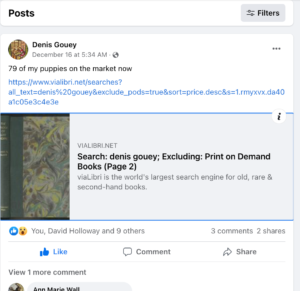A second viaLibri Virtual Rare Book Showcase was recently announced and is now set to open on February 20, 2025. The results from our first showcase in December exceeded my modest expectations and left me encouraged to see what would happen if we tried another round. Exhibitor registration has already begun. Several of our original exhibitors have already signed up for our next virtual event and others have promised to join them.
After first open registration back in September I did start to worry that two weeks before Christmas might not be the ideal time to launch an event like ours. None of us had noticed until too late that there were 5 other virtual book fairs that had also scheduled their events for the beginning of December. Even an ardent believer in online bookselling like myself could not help wondering if there could really be that much demand, especially at a time of the year when our hoped-for customers have so many other obligations and activities to divert them from buying and selling old books.
Fortunately, my concerns in the end proved groundless. Over 250 booksellers at half a dozen web sites, including our own, did eventually sign up as virtual exhibitors in one place or another. Buyers did also come and their numbers were eagerly counted, for those who were interested, with software like Google Analytics.
But for me the metric of most interest is not the number of buyers and vendors but, more importantly, the total value of the items that are bought and sold. More than just page views, those are numbers you can take to the bank.
I don’t usually measure the value of my books by counting them, and yet it is not uncommon for a bookseller to talk about his success or failure at a book fair not in terms of cost or value, but in terms of quantity instead. This is natural, of course. At the end of a busy online fair however, I often find myself scrolling through listings and stopping most often to examine the books that have already been sold. These are frequently the most interesting and they provide one of the great benefits of online book buying in contrast to “live” fairs. At a live fair a sold item is removed from sight almost immediately. An online item stays visible to an interested bibliophile until the virtual event has closed. The amount to be learned from this kind of bibliophilic exploration should not be ignored.
There is, however, a great frustration encountered here. All the text and images of sold items remain visible until the end of the event, except for the prices. If you see a sold book that you might also like to own yourself it is difficult, if not impossible, not to wonder how much it sold for. Serious booksellers (not to mention collectors) are inevitably interested in the state of the marketplace. If so, how do they evaluate a marketplace where they are unable to know the prices of the things that have actually been sold?. Auction houses actively report the prices of the things they sell (or fail to sell) and report a grand total when the sale is over. Regular live fair organisers like the ABA and PBFA diligently collect show slips at the close of a fair and then publish the results for all their members to see. The virtual fairs, on the other hand, usually keep that information all to themselves. This seems like a mistake to me. It is the virtual fairs that suffer, understandably, from the greatest skepticism regarding how much buying and selling their sites actual produce. This is where buyers would want the maximum transparency. Without it they would only expect uncertainty, if not complete skepticism. Exhibitors who sold nothing would naturally assume that everyone else did the same. On the other hand, the exhibitors who did have strong sales might prefer to keep it to themselves – but still being sure to exhibit again at the next opportunity.
For our own contribution to the cause of transparency I would begin by reporting that total sales at our December virtual showcase added up to $61,610 with sold items priced from $20 to $17,500, including 8 with prices in 4 figures or more. 53 exhibitors sold a total of 58 items while 33 exhibitors did not sell any of the items they had listed. (These numbers have been adjusted upwards to include a €7000 library purchase that was not formally approved until January.)
The median price for sold items was $395 while the mean price was $1030. The listed prices had a median of $1200 and a mean of $4137. Of the 22 exhibitors who reported sales, 13 sold multiple items, while 8 sold at least 4 or more. (These are the original calculations, published earlier).
In its entirety the overall profitability of the virtual showcase was, I think, satisfying. While gross sales came to a total of $61,598 the total participation cost for all 57 exhibitors was only $11,634. That would mean that overall the average exhibitor’s virtual booth rent came to only 21% of what they sold.
There is one other interesting thing I discovered in our showcase statistics. Like everyone else, I took it for granted that all the heavy buying at online book fairs takes place on the first day, usually Thursday, if not just the first 2 or 3 hours after things go live. Until we had our own data to look at I had no way to test this assumption. After the showcase was finished, however, I was able to look at some real numbers. What I found was that total sales on Thursday were only $292 greater than those Friday, Saturday and Sunday combined. Thursday still lead the pack, but not by much. I also wondered what our data could tell me about measuring visitor traffic as opposed to sales. Here I found that over all 4 days we had a total of 3693 unique users. As expected, the largest number came on Thursday (1796). But after that, to my great surprise, Sunday came in second (975), Friday came in a close third (941) while Saturday dragged in far behind (466). And these were buyers, not just browsers. On Sunday they bought a total of 6 books at an average price of $224. I thought that was a relatively encouraging number, not so terribly far behind the average for all 4 days.
Once having noticed these unexpected results I wondered if it was my negative expectations about weekend sales that had always been wrong, or if there was something we did differently that might explain these results. Eventually a likely explanation came to mind. Most book fairs, whether live or virtual, are stand alone events. They are destinations for bibliophiles who already know about them and have planned to attend. They will want to be there when doors open. If they come on Sunday it will most likely be a return visit. In the case of a virtual showcase, however, there will also be collectors who know and regularly use the viaLibri search engine but may not be aware of our virtual events. They could be browsing or searching at any hour of the day on any day of the week, including Sundays. If they are already looking for books on vialibri.net they may easily decide to take a look at what is happening on vialibri.net/showcases since they will already be there.
As mentioned at the beginning, we are now planning another virtual showcase for Thursday, February 20 through Sunday, February 23. Exhibitor registration is open now. If you would like to be notified and receive further details please click one of the links below.
 Our third virtual showcase is now in preparation and scheduled to open on April 24. If you are a professional bookseller looking to reach an international audience of serious book lovers we think a virtual shelf in our next showcase will be the ideal place for you to display to the world your rarest and most exciting offerings. There are many reasons why we believe this will be the ideal online venue for you to showcase your choicest items for both new and familiar customers. They include:
Our third virtual showcase is now in preparation and scheduled to open on April 24. If you are a professional bookseller looking to reach an international audience of serious book lovers we think a virtual shelf in our next showcase will be the ideal place for you to display to the world your rarest and most exciting offerings. There are many reasons why we believe this will be the ideal online venue for you to showcase your choicest items for both new and familiar customers. They include:
 added to the count and began including books and ephemera from Getman’s Virtual Book Fairs – the oldest, largest and best known virtual book fair platform.
added to the count and began including books and ephemera from Getman’s Virtual Book Fairs – the oldest, largest and best known virtual book fair platform.
 It was formed in 2005 by the Asociación Profesional del Libro y Coleccionismo Antiguos with members from nearly all the Autonomous Communities of Spain. It operates as a non-profit association owned and controlled exclusively by its members.
It was formed in 2005 by the Asociación Profesional del Libro y Coleccionismo Antiguos with members from nearly all the Autonomous Communities of Spain. It operates as a non-profit association owned and controlled exclusively by its members. well-known bookbinder from Connecticut. Naturally, he is interested in promoting his skills on the internet. You can find him on Facebook where, on Friday, he published a post that links to a viaLibri search result listing all the books on viaLibri that match on the keyword “Denis Gouey”. As a result, anyone visiting him on facebook can click on this link and see pictures of lots of books bound by him and currently for sale online.
well-known bookbinder from Connecticut. Naturally, he is interested in promoting his skills on the internet. You can find him on Facebook where, on Friday, he published a post that links to a viaLibri search result listing all the books on viaLibri that match on the keyword “Denis Gouey”. As a result, anyone visiting him on facebook can click on this link and see pictures of lots of books bound by him and currently for sale online.